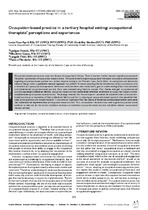| dc.contributor.author | Hess-April, Lucia | |
| dc.contributor.author | Dennis, Lynique | |
| dc.contributor.author | Ganas, Nicolette | |
| dc.contributor.author | Phiri, Lungelo | |
| dc.contributor.author | Phoshoko, Pumza | |
| dc.date.accessioned | 2018-08-24T09:00:13Z | |
| dc.date.available | 2018-08-24T09:00:13Z | |
| dc.date.issued | 2017 | |
| dc.identifier.citation | Hess-April, L. et al. (2017). Occupation-based practice in a tertiary hospital setting: occupational therapists’ perceptions and experiences. South African Journal of Occupational Therapy , 47(3): 25-31 | en_US |
| dc.identifier.issn | 0038-2337 | |
| dc.identifier.uri | http://dx.doi.org/10.17159/2310-3833/2017/v47n3a5 | |
| dc.identifier.uri | http://hdl.handle.net/10566/3971 | |
| dc.description.abstract | Occupation-based practice is an important feature of occupational therapy. There is however limited research regarding occupational
therapists’ experiences with occupation-based practice. This study aimed to explore occupational therapists’ perceptions and experiences
regarding occupation-based practice in a tertiary hospital setting in the Western Cape, South Africa. An explorative and descriptive
research design within a qualitative research approach was utilised. Purposive sampling allowed the selection of four participants with
a minimum of 2 years practice experience. Semi-structured interviews were conducted to gain an understanding of how they perceived
and implemented occupation-based practice. Data were analysed using thematic analysis. Four themes emerged: occupation-based
practice expresses professional identity; occupation-based practice necessitates relevance; constraints to occupation-based practice;
and facilitators of occupation-based practice. The findings revealed that the participants’ perceived the implementation of occupation-based
practice as an expression of their professional identity and that in adopting an occupation-based approach they perceived their
roles as being diverse and transformational. It was however highlighted that the nature of the service context posed several constraints
that influenced the implementation of occupation-based practice. Thus, occupational therapists may need to generate practice-based
evidence to advocate for the service conditions necessary to implement occupation-based practice and deliver relevant occupational
therapy services. | en_US |
| dc.language.iso | en | en_US |
| dc.publisher | Occupational Therapy Association of South Africa | en_US |
| dc.rights | This Open Access journal is distributed under the terms of the Creative Commons License [CC-BY-NC-ND 4.0]. Under this license, authors agree to make articles available to users, without permission or fees, for any lawful, non- commercial purpose. Users may read, copy, or re-use published content as long as the author and original place of publication are properly cited. | |
| dc.subject | Occupational therapy profession | en_US |
| dc.subject | Occupation-based practice | en_US |
| dc.subject | Tertiary hospitals | en_US |
| dc.subject | Qualitative research | en_US |
| dc.title | Occupation-based practice in a tertiary hospital setting: occupational therapists’ perceptions and experiences | en_US |
| dc.type | Article | en_US |
| dc.privacy.showsubmitter | FALSE | |
| dc.status.ispeerreviewed | TRUE | |
| dc.description.accreditation | DHET | |

